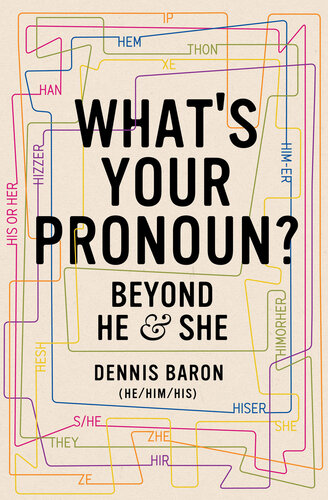
What's Your Pronoun?
Beyond He and She
کتاب های مرتبط
- اطلاعات
- نقد و بررسی
- دیدگاه کاربران
نقد و بررسی

October 14, 2019
University of Illinois professor emeritus Baron debuts with an entertaining and thoroughly documented account of two centuries’ worth of attempts to solve the problem of the English language’s “missing word”: a third person singular pronoun that includes all genders. Baron affirms the singular “they” is the best option by documenting the pronoun’s long history in idiomatic English; asserting that “top-down directives” by lawmakers and style manuals “don’t change language use”; and providing data about the popularity of “they” among people who self-identify as “trans, genderqueer, or nonbinary.” He also digs deeply into the legal and cultural implications of pronoun usage, such as the generic “he” in the Constitution and Bill of Rights, and addresses neologisms such as “hiser” and “thon,” which met with the approval of grammarians in the 19th and 20th centuries, but never achieved significant public usage. According to Baron, “everybody hates” the only strictly grammatical option: “his or her.” In conclusion, he offers an “annotated historical lexicon” of more 250 gender-neutral pronouns, a gold mine for readers who delight in the strangeness of language, as well as a clear demonstration of the thorniness of the issue. This easygoing, comprehensive guide will appeal to progressive word geeks.

October 15, 2019
A thorough history of pronoun debates. Guggenheim fellow Baron (Emeritus, English and Linguistics/Univ. of Illinois; A Better Pencil: Readers, Writers, and the Digital Revolution, 2009, etc.) examines what seems like a contemporary question with a historical lens. In this primer, he reveals a centurieslong search for a singular gender-neutral pronoun in English, dispelling persistent myths that such a quest is a recent effort or the product of politically correct motivations. The author traces the discussion of the search further than skeptics may expect, adding a full chronology, dating back to the 1790s, that tracks invented alternates. In addition to extensive notes on the editors, educators, writers, and others who have added their opinions and alternatives to the effort, Baron also archives insights on the popular and common uses of a singular "they." Like the plural and singular form of "you," "they" is a word people have used consistently for centuries, even by those who dispute the choice for grammatical imprecision. In chronicling this ongoing argument over accuracy, intent, and meaning, Baron demonstrates the long-standing efforts to seek, identify, and create alternates for the oft-maligned phrase "he or she." Arranged thematically, some chapters overlap in content, but overall, they offer helpful, nuanced considerations about the power and politics of attempts to control how language evolves. Whether based on authorial intent or individual identity, Baron's catalog of the missing singular form also offers detailed proof that inventing, discovering, or seeking gender-neutral pronouns is not a new endeavor. The author's playful tone imbues the text with friendly sensitivity, and readers will appreciate his decades of research and meticulous attention to documents and sources. The result is a book that reflects the transformational capacity of language. A lively book for language lovers, those confused about uses of they/them, and anyone curious about writing while gendered.
COPYRIGHT(2019) Kirkus Reviews, ALL RIGHTS RESERVED.

Starred review from November 1, 2019
In recent years, pronouns have sparked debates across the country. People are adopting pronouns that are different from "he" or "she," and businesses, schools, and other institutions have started including other pronoun options on forms and applications, risking criticism from their communities and from grammarians alike. In this book, Baron (English, Univ. of Illinois) focuses on the grammatical argument for a universally accepted gender-neutral pronoun in English. He discusses the politics of pronouns, specifically how the nonexistent third-person, gender-neutral pronoun led to codified sexism (the use of "he" meaning any person, and the implied and explicit hierarchy of the sexes therein) and codified racism (using it in documents regarding slaves). Baron also discusses how alternate pronouns are not a new thing, but instead have been used for centuries as the search for gender-neutral (and nonbinary) pronouns has progressed; the oldest documented gender-neutral pronoun is ou, which dates back to 1789. VERDICT Based on decades of research, Baron's masterly work documents the historical and continued importance of personal pronouns. Those interested in gender politics or English grammar, or who feel that "he" and "she" are inadequate, would benefit greatly from perusing this book.--Ahliah Bratzler, Indianapolis P.L.
Copyright 2019 Library Journal, LLC Used with permission.

November 1, 2019
If it is true, as Baron declares, that Pronouns are suddenly sexy, then his nearly 300-page devoted to that part of speech must be X-rated! But, alas, there's nothing especially titillating here, only talk of such esoterica as the generic he, the invented pronoun (thon, anyone?), and the search for the missing word: a third-person singular, gender neutral, nonbinary pronoun. All of this, he says, is tied directly to the recent focus on gender inclusivity, nonbinary gender, and gender nonconformity. While he gives attention to current circumstances, he spends more time on a deep dive all the way back to the first English grammars of the seventeenth century, evidencing that his quest is hardly new. He doesn't limit his search to history, however; he eventually turns his attention to the political controversies that have brought pronouns into the limelight, ending his search with the declaration that the missing word is (drumroll, please) the singular they. He concludes with a flourish: an �berambitious, 58-page chronology of gender-neutral and nonbinary pronouns. Esoteric? Yes, but catnip for the grammarian, especially the culturally and politically conscious variety.(Reprinted with permission of Booklist, copyright 2019, American Library Association.)

























دیدگاه کاربران